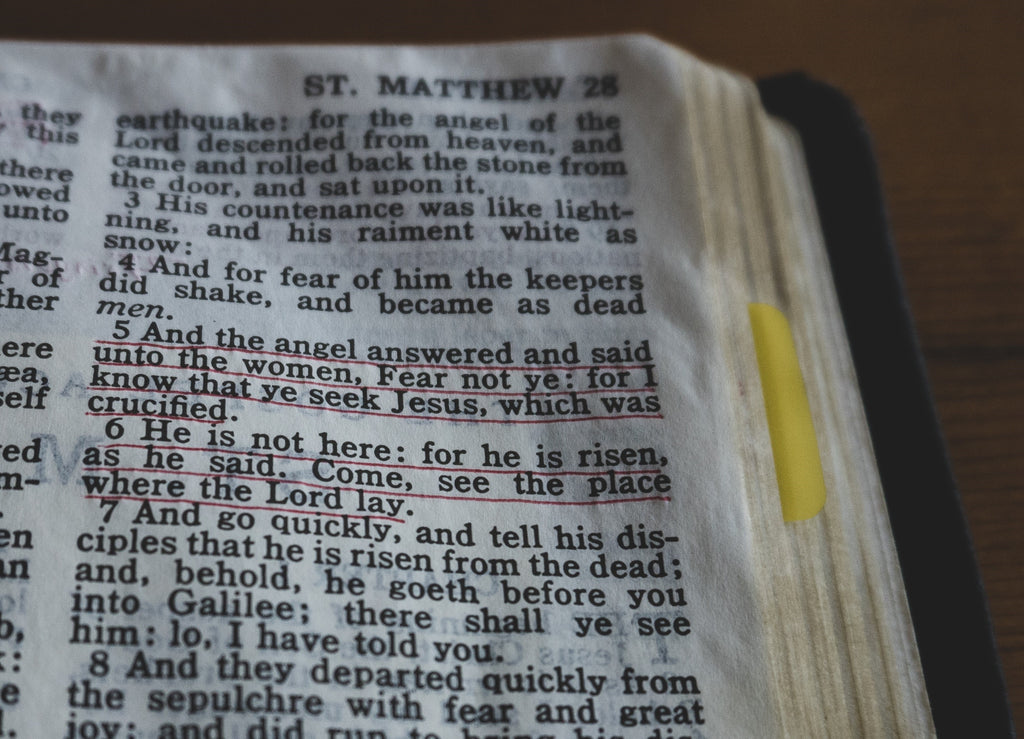What is the REAL meaning of Matthew 7:24-27? (Deep Dive - Bible Study & Commentary)

What is the REAL meaning of Matthew 7:24-27? (Deep Dive - Bible Study & Commentary)
Table of Contents
As Christians, we often find solace and strength in the powerful words of a beloved hymn that contains great truth: "On Christ the solid rock, I stand, all other ground is sinking sand."
These lyrics serve as a reminder of the unshakable foundation we have in Christ—a foundation that should form the bedrock of our daily lives.
In a world where uncertainty and shifting sands prevail, we are called to make Christ the cornerstone of our existence, to embrace Him with steadfast faith, and complete surrender, and as the guiding force behind every facet of our being.
Who wrote Matthew 7:24-27 and when was it written?
Matthew 7:24-27 was written by Apostle Matthew. It was written between 70 and 90 AD.
What is the context of Matthew 7?
The context of Matthew 7 revolves around Jesus' teachings on judgement, discernment, and the importance of living out faith.
Before this chapter was written, Jesus had already been teaching and performing miracles throughout Galilee.
Crowds were following Him, and His reputation as a powerful teacher and healer had spread far and wide.
This chapter is part of the Sermon on the Mount, which began in Matthew 5 and continued through Matthew 6.
The Sermon on the Mount is a collection of Jesus' teachings on various subjects, such as true righteousness, prayer, and love.
This chapter serves as the conclusion to this sermon. It is important to note that Jesus delivered these teachings to both His disciples and the multitude gathered around Him.
One of the most well-known verses in this chapter is the opening verse, "Judge not, that you be not judged."
This verse is often quoted and is a cornerstone of Christian ethics. But what does it mean in the context of the Sermon on the Mount?
In this verse, Jesus was cautioning against a critical and judgmental attitude towards others.
He emphasized the importance of humility and refraining from passing judgement on others. The reason is clear: when we judge others harshly, we open ourselves up to the same level of scrutiny.
Jesus calls for a spirit of grace and forgiveness, urging us to address our flaws before condemning others.
He went further, encouraging His followers to pray with persistence and confidence.
He used three verbs: ask, seek, and knock, to illustrate the importance of an active and earnest prayer life.
“Ask, and it will be given to you; seek, and you will find; knock, and it will be opened to you. For everyone who asks receives, and he who seeks finds, and to him who knocks it will be opened.” (Matthew 7 verses 7 to 8)
A particular verse of the chapter often referred to as the Golden Rule, verse 12 highlights the essence of Jesus' teachings on ethical conduct.
He mandated that His followers treat others the way they would like to be treated. This principle goes beyond mere reciprocity; it is a guiding principle for living a righteous and compassionate life.
Jesus introduced the concept of two contrasting paths: the wide gate and the narrow gate.
The wide gate represents the path of least resistance, which leads to destruction. It is the way of worldly indulgence and self-centeredness, chosen by many.
Conversely, the narrow gate symbolizes the path of righteousness and holiness, but it is not an easy road.
Jesus made it clear that following Him requires effort and dedication. Choosing the narrow path involves making moral and spiritual choices that may not align with the values of the world.
“Enter by the narrow gate; for wide is the gate and broad is the way that leads to destruction, and there are many who go in by it. Because narrow is the gate and difficult is the way which leads to life, and there are few who find it.” (Matthew 7 verses 13 to 14)
Further in the passage, Jesus made a sobering reminder that the mere profession of faith or the performance of outward faith in the favour of men is not sufficient for salvation.
He emphasized that those who enter the kingdom of heaven are those who do the will of His Father.
In the concluding verses of the passage, Jesus employed a powerful analogy involving two builders.
One builder is wise, building his house on a solid foundation of rock, while the other is foolish, constructing his house on shifting sands.
When storms come, only the house built on the rock remains standing.
This parable teaches a great lesson about the importance of applying Jesus' teachings in our lives.
The "rock" represents a firm foundation in Christ, rooted in obedience to His words. The "sand" symbolizes a shallow, superficial faith that crumbles in the face of trials of life.
“But everyone who hears these sayings of Mine, and does not do them, will be like a foolish man who built his house on the sand: and the rain descended, the floods came, and the winds blew and beat on that house; and it fell. And great was its fall.” (Matthew 7 verses 26 to 27)
By drawing this analogy, Jesus emphasizes that true faith is demonstrated through action, not just words.
What is the message of Matthew 7:24-27?
The message of Matthew 7 verses 24 to 27 focuses on building a firm foundation in Christ through faith and obedience.
The first message teaches the importance of having Christ as our firm foundation. It says,
“Therefore whoever hears these sayings of Mine, and does them, I will liken him to a wise man who built his house on the rock: and the rain descended, the floods came, and the winds blew and beat on that house; and it did not fall, for it was founded on the rock.” (Matthew 7 verses 24 to 25)
In this analogy, the rock symbolizes the teachings of Jesus Christ. The teachings of Christ are the solid foundation upon which we are to build our lives.
Just as a wise builder chooses a sturdy rock as the foundation for a house, a wise Christian chooses to build their life upon the solid rock of Christ's teachings, the rock foundation that stand against the coming storm.
The house built on this rock represents our lives. It includes our beliefs, values, choices, and actions. It is a metaphor for the entirety of our existence.
The stability of our house depends on the foundation we choose, just as the stability of our lives depends on our adherence to Christ's teachings.
The elements—rain, floods, and winds—represent the challenges and trials of life.
Just as storms can be unpredictable and relentless, so too can the challenges that life presents to us.
These challenges can come in various forms, such as personal hardships, temptations, and moral dilemmas.
The wise builder in this passage represents the Christian who hears the teachings of Jesus and obeys them.
Obedience to Christ's teachings involves not only listening to His words but also putting them into practice in our daily lives. This obedience ensures that our house is built on a firm and proper foundation.
Conversely, the second part of the passage talks about the foolish builder, who represents the Christian who hears Christ's teachings but does not obey them.
This individual may know Christ's words but fails to put them into action. Such a person builds their life on a shaky foundation, symbolized as sand in the passage.
Hence, the core message of the passage is the importance of not only hearing Christ's teachings but also actively applying them.
It's not enough to merely listen to sermons, read the Bible, or attend church services. True wisdom comes from obeying and living out what we have learned.
This principle is found in the Parable of the Two Sons in Matthew 21 verses 28 to 32. In this story, Jesus tells of a father who asks his two sons to work in the vineyard.
One initially refuses but later changes his mind and goes to work, while the other agrees but does not follow through.
Jesus asks, "Which of the two did the will of his father?" (Matthew 21 verse 31).
The answer, of course, is the one who obeyed.
Similarly, we must be like the first son, actively doing the will of our heavenly Father by obeying Christ's teachings.
Another message in the passage is the reminder that life is full of hardships. It is filled with storms—challenges, difficulties, and trials.
These storms serve as a test of the foundation upon which our lives are built. When we build our lives on the solid rock of Christ's teachings, we are better equipped to withstand the storms that come our way.
Let us consider the story of Jesus calming the storm in Matthew 8 verses 23 to 27. As Jesus and His disciples sailed across the Sea of Galilee, a great tempest arose.
The disciples, fearing for their lives, woke Jesus, who rebuked the winds and the sea, and there was a great calm.
In this story, Jesus demonstrated His authority over the natural elements, teaching us that when we have Him as our foundation, we can find peace even in the midst of life's storms.
This passage teaches that building our lives on anything other than Christ's teachings leads to dire consequences, as demonstrated by the fate of the foolish builders awaiting great crash.
Therefore, the message is clear: to build a Christ-like life, we must build it on the solid rock of His teachings.
Hearing and knowing His words are important, but the true test of our faith lies in our obedience and application of those teachings.
What does it mean to combine faith with work?
Faith with work is a demonstration of our belief in God through good works such as kindness, love, and service to God, among others.
Faith, as described in Hebrews 11 verse 1, is “the substance of things hoped for, the evidence of things not seen.”
This definition highlights that faith is a deep and steadfast belief in God and His promises, even when we cannot see them with our eyes.
Many believers find comfort in attending church services, hearing sermons, and reading the Bible regularly.
While these activities are important for nourishing our faith, they are incomplete without action.
A true believer and a wise person is one who put the perfect law, which is the word of God, into action.
James 2 verse 17 emphasizes this point, stating, “Thus also faith by itself, if it does not have works, is dead.”
In simpler terms, faith is like a seed, and works are the soil, sunlight, and water that enable it to grow. Without work, faith remains stagnant and unproductive.
Therefore, it is important to understand that faith without corresponding actions is insufficient to please God.
Noah's story is a prime example of faith with work. God told Noah to build an ark to save his family and two of every kind of animal from a devastating flood.
Despite facing ridicule and disbelief, Noah obeyed God's command and diligently built the Ark. His faith in God's promise was demonstrated through his actions.
As a result, he and his family were saved, showcasing the powerful combination of faith and work.
Abraham's faith in God was tested when he was asked to sacrifice his beloved son, Isaac.
Although this request seemed incomprehensible, Abraham trusted God and was willing to act on His command. His faith was displayed through his willingness to carry out this challenging task.
God ultimately provided a ram for the sacrifice, affirming the importance of obedience-based faith.
In Matthew 8 verses 5 to 13, a Roman centurion approached Jesus, seeking healing for his servant.
Jesus marvelled at the centurion's great faith, declaring that He had not found such faith in all of Israel.
The centurion's faith was expressed through his belief in Jesus' authority and his plea for healing. His actions demonstrated faith.
In the context of faith, "work" does not necessarily refer to secular employment or manual labour. Instead, it contains a broader meaning.
Work, in the context of faith, includes actions, deeds, and obedience that align with God's will and His commandments.
Some essential aspects of work in the context of faith include, first, obedience to God's commandments. This is a fundamental aspect of working in faith.
When we follow God's instructions and live according to His Word, we are actively working out our faith.
Also, expressing love and kindness to others is a form of work that emanates from faith.
Acts of love, such as helping the needy, forgiving others, and showing compassion, are essential manifestations of faith in action.
Engaging in prayer and worship is a form of spiritual work. These practices strengthen our faith, deepen our relationship with God, and prepare us for the work He has ordained for us.
Sharing the message of Christ with others is another significant work of faith. By evangelizing and bearing witness to God's grace, we actively participate in God's redemptive plan.
Similarly, maintaining faith during trials and challenges is a form of spiritual work. Enduring hardship with faith in God's promises demonstrates our commitment to Him.
Therefore, as Christians, we are called to demonstrate our faith through our actions.
When we combine our faith with work, we can move mountains, overcome obstacles, and fulfill the purpose God has for each of us.
So, let us be not just hearers of the Word but doers of the word, for it is through our works that our faith shines brightly, bringing glory to our Heavenly Father.
What is Obedience to God in the Bible?
Obedience to God is faithfully following His teachings and commandments with a humble and willing heart.
In the old testament Exodus 19 verse 5 says,
“Now, therefore, if you will indeed obey My voice and keep My covenant, then you shall be a special treasure to Me above all people; for all the earth is Mine.”
In these words, God establishes a covenant with His people, emphasizing the significance of obedience.
He offers a unique relationship with those who choose to listen and follow His commands.
Moses, a great figure in the Bible, serves as an exemplary model of obedience to the Word of God. His encounter with God on Mount Sinai exemplifies this virtue.
Exodus 24 verses 3 to 4 says, “So Moses came and told the people all the words of the Lord and all the judgments. And all the people answered with one voice and said, 'All the words which the Lord has said, we will do. and Moses wrote all the words of the Lord. And he rose early in the morning, and built an altar at the foot of the mountain, and twelve pillars according to the twelve tribes of Israel”
Moses faithfully conveyed God's words to the people, and their unanimous response reflects their desire to obey the divine commandments.
This demonstrates how obedience begins with understanding and acknowledging the Word of Christ.
Let us examine one of the most renowned bible studies in the Bible, the Sermon on the Mount in Matthew 5 verses 3 to 12.
This sermon contains teachings on various aspects of Christian living.
Emphasis on the two verses below
“Blessed are the poor in spirit, for theirs is the kingdom of heaven.” (Verse 3)
“Blessed are those who hunger and thirst for righteousness, for they shall be filled.” (Verse 5)
The entire sermon serves as a blueprint for living in alignment with God's will. Blessings are always attached to obedience to God.
When we obey God, we become eligible for His blessings.
Moving forward, we find valuable insights on obedience in the writings of the apostle Paul.
He emphasizes the importance of aligning one's life with the Word of Christ in his letter to the Romans.
Romans 12 verse 2 says, "And do not be conformed to this world, but be transformed by the renewing of your mind, that you may prove what is that good and acceptable and perfect will of God."
Paul encouraged believers to renew their minds, allowing the Word of Christ to transform them. This renewal is an act of obedience to God's will and purpose for our lives.
By faith, Abraham obeyed when he was called to go out to the place where he would receive inheritance. And he went out, not knowing where he was going.
Abraham's initial obedience in leaving his homeland demonstrates faith and trust in the Word of God, illustrating the importance of obeying God's guidance.
Therefore, as believers, we are called to a life of obedience and complete trust in Christ's word and His love for us.
We truly embrace the title 'Christians' when we faithfully follow all the teachings of Christ and heed the guidance of the Holy Spirit."
May we, as followers of Christ, continually seek to heed His Word, allowing it to impart our hearts and actions.
As we do so, we will find that obedience is not a burden but a source of joy, fulfilment, and eternal significance in our Christian journey.
How do I apply Matthew 7:24-27 to my life?
Applying the teachings of Matthew 7 verses 24 to 27 involves living a life rooted in prayer, studying God’s word, obedience and other works of faith.
First, you should start by reading and meditating on the Scriptures daily. Make it a habit to listen to God's Word and understand His teachings.
Remember the parable of the sower in Matthew 13 verses 3 to 8, where different types of soil represent various responses to God's Word?
Aim to be the good soil that receives the Word, allowing it to take root and grow in your life.
In John 14 verse 15, Jesus emphasized the importance of obedience, saying,
“If you love Me, keep My commandments.”
When you choose to obey God's Word, you're not merely listening but actively participating in building your spiritual house.
To build a strong and good foundation, seek wisdom and understanding.
In the parable of the wise and foolish virgins (Matthew 25 verses 1 to 13), the wise virgins were prepared with extra oil for their lamps, symbolizing their wisdom and foresight.
Be vigilant in seeking spiritual wisdom through prayer, reading the Bible, and seeking guidance from mentors, pastors, or mature believers.
A strong spiritual foundation is a true foundation which is reinforced through consistent communication with God in prayer.
In 1 Thessalonians 5 verse 17, Paul exhorts us to "pray without ceasing."
The story of Daniel in the Lion's Den in Daniel 6 illustrates the power of consistent prayer. Daniel's commitment to prayer led to miraculous protection and ultimately brought glory to God.
Make prayer an integral part of your daily routine, seeking God's guidance, strength, and wisdom in every aspect of your life.
Ultimately, the most important aspect of building a strong foundation is your relationship with Christ. In Colossians 2 verses 6 to 7, Paul encourages us,
“As you have therefore received Christ Jesus the Lord, so walk in Him, rooted and built up in Him and established in the faith.”
Your foundation must be rooted in Christ's love, grace, and teachings. The story of the vine and branches in John 15 verses 1 to 8 talks about the importance of abiding in Christ to bear fruit.
Cultivate a deep, intimate relationship with Jesus through worship and studying His Word.
It is important to note that building a solid spiritual foundation does not guarantee a life without storms. However, it ensures that when the storms come, you can withstand them.
In Acts 16 verses 16 to 40, we see Paul and Silas enduring imprisonment and persecution. Their faith and trust in God not only sustained them but also led to the conversion of the jailer and his household.
When you encounter trials and tribulations, stand firm in your faith, knowing that your foundation in Christ will see you through.
Therefore, always remember that building a solid spiritual foundation is a lifelong process. It requires commitment, dedication, and a reliance on the grace of God.
As you apply these practical steps to your daily life, you will find yourself growing closer to God and living out the beautiful lessons of the passage.
As a true Christian and an obedient Christian, build your house on solid ground where no storm of trial of life or challenges of this world cannot torment you.
A lot of people in the church today are only hearers of the word. They attend church every Sunday morning and also Sunday school teachings but their actions are not better than that of an unbeliever.
May your life be a testimony to the wisdom of building on the Rock that is Christ, and may your foundation stand firm in all seasons of life.
What is Matthew 7:24-27 prayer?
Heavenly Father, your Word reminds me of the importance of building my life on the solid foundation of Your teachings.
Lord, I pray for the wisdom and strength to be not just a hearer of Your Word but a doer. Help me to apply the lessons from Your Word to my life daily.
I confess that I have sometimes been like the foolish builder, relying on my own understanding and leaning on the shifting sands of this world.
But today, I surrender all to You, acknowledging that only in You can I find true security and lasting peace.
Lord, grant me the discernment to recognize the storms of life for what they are and the faith to stand firm when they come. This I pray in Jesus' name, Amen.
Conclusion
In summary, the parable of the barren fig tree and the teachings of this passage provide valuable insights into the Christian journey.
Both passages emphasize the importance of not just hearing but also applying the teachings of Jesus in our lives.
We are called to be fruitful, bearing the fruits of faith, love, and obedience in response to God's grace.
To build a Christ-like life, we should surround ourselves with a supportive community of fellow believers to foster accountability and growth in our faith.
These relationships sharpen our spiritual walk and help us stay steadfast in our commitment to Christ's teachings which reflects in our outward appearance on a daily basis and in our Christian life.
Ultimately, as Christians, our faith is not merely a set of beliefs but a way of life.
By actively living out our faith through obedience and good works, we become living testimonies of God's power and bring glory to our Heavenly Father.
In this journey, let us remember that faith without action is incomplete, and it is through our actions that we demonstrate our love for God and others.
SHARE:






















